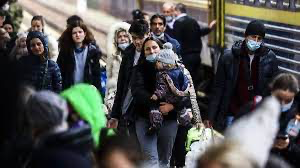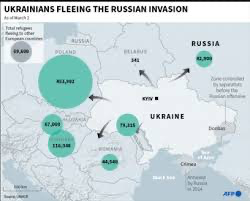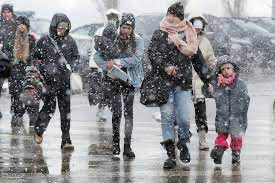
The recent starting of war in Ukraine has led to roughly 2.97 million Ukrainians fleeing the country. The refugees are mostly women and children due to a government-enforced national law that prohibits men ages 18-60 from leaving.
As of Tuesday, March 8, 505,000 Ukrainians have taken shelter in Poland, 139,000 to Hungary, 97,000 to Moldova, 51,000 to Romania, 72,000 to Slovakia, and 90,000 to other European countries like Germany and England. A shocking 48,000 Ukrainians have gone into Russia for safety.

The majority of these refugees are being transported to other countries via train, car, or even by foot. These refugees travel miles too long waiting lines before they are allowed to enter any of the other countries.
Refugees who found the time to pack some of their belongings have filled their bags with whatever could possibly fit. A small number of refugees can afford their own accommodations while others stay in government-provided shelters and churches, or their close families.
Some private companies have made accommodations possible for refugees. A large contributor is Airbnb, which has offered free short-term housing for 100,000 Ukrainian refugees and is currently working to arrange long-term stays in multiple countries.
“I think that it’s nice of them to help the refugees in any way they can,” said Ryan C., a junior at AISG.
On Saturday, March 12, roughly 123,000 refugees arrived in Germany. However, this number has been steadily increasing because of the absence of border checks between Poland and Germany.
In North America, Canada and the US have now started to offer help to the refugees by fast-tracking Ukrainian applications for both temporary and permanent residency status and family reunification applications.
“I think that accepting a certain number of refugees from Ukraine would be a good way for the US to still show their alliance and support of Ukraine,” said Alanis M., a sophomore at AISG

Poland is the only country so far to accept refugees with or without a passport. However, the lines at the border crossings are so long that the average wait time is about 60 hours. The temp has dropped to freezing so most people are sleeping in their cars, however, this has caused the traffic to become so bad that the Polish government has asked volunteers to not show up at the border.
There have been numerous reports from several borders that black refugees and many people of color are being told to go to the back of the line because “Ukrainians” took priority. The majority of these people are students who had been studying in Ukraine.
These Ukrainian refugees are having to leave their homes and communities to travel in freezing temperatures and cramped transportation to other countries where they might be safe. Help is being offered to the refugees from many different places like other countries and private companies to make this easier.